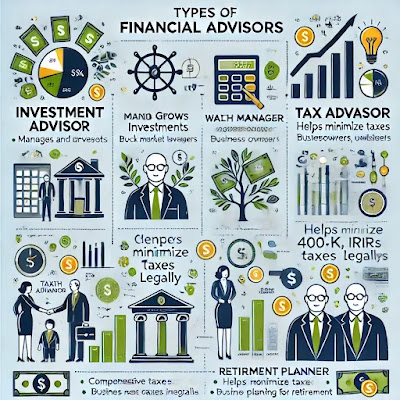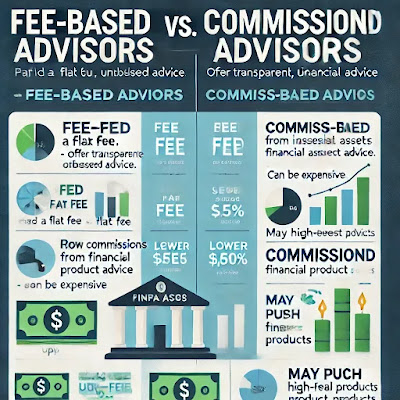Financial Advisor Explained: Do You Need One & How to Choose Wisely?
What Does
a Financial Advisor Do? Here’s What you need to know
Money
management can be overwhelming—we know that when it comes to taking decisions in
life, it requires experience.
Similarly,
when it comes to investments, retirement planning, and risk management, it all
requires careful strategy; that’s where financial advisors come into the picture.
But the main
question is what exactly does a financial advisor do? Are they worth hiring? Do they have the
ability and required knowledge to help you make these decisions? Here in this
article we will know about their roles, types, and benefits of hiring one of these nerds. Not only that, we will help to give some tips on how you can find the
right one for you.
What Does
a Financial Advisor Do?
A Financial
Advisor is an individual who helps manage your money by providing guidance on investments, retirement plans, budgeting, and many more in order to help you
achieve your goal.
Just to get
an idea following are the areas where he cn be quite helpful
·
Investment : Stocks
of a Company, mutual funds or maybe crypto😜
·
Retirement :
Individual Retirement Arrangements (IRAs)
·
Tax Optimization : Reducing Tax Liabilities
·
Risk Management : Such as your insurance (car, health, etc) debt control,assets protection
·
Estate Management: Managing your wills, trust, inheritance.
Types of
Financial Advisor:
Not all the financial adivsors offer the same services. Here
is a breakdown
| Type | Services Provided | Best For |
|---|---|---|
| Investment Advisor | Manages and grows investments | Stock market investors |
| Wealth Manager | Comprehensive financial planning | High net-worth individuals |
| Tax Advisor | Helps minimize tax easily | Business onwers,freelancers |
| Retirement Planner | Guides on 401(k)IRAs,pensions | People planning for retirement |
Fee-Based
vs. Commission-Based Advisors: Which is Better?
| Payment Model | How They Get Paid | Pros | Cons |
|---|---|---|---|
| Fee-Based | Flat-fee or percentage of assets | Transparent/unbiased advice | Can be expensive |
| Comission-Based | Earns commission from product sales | Lower upfront cost | May push high fee-products |
📌 Pro Tip: Always ask how your
advisor is compensated to ensure their recommendations align with your best
interest.
How to
Choose the Right Financial Advisor
Before
hiring a financial advisor, consider these steps:
✅ Check Their Credentials: Look for CFP®, CFA, or CPA certifications.
✅ Understand Their Fee Structure: Fee-only advisors
tend to be more transparent.
✅ Look for Experience: Ask how long they’ve been in
business and their expertise in your financial needs.
✅ Read reviews and testimonials -Research their
reputation online and check client feedback.
✅ Ensure They Align With Your Goals: Choose an advisor
who specializes in what you need, whether it’s investing, retirement, or tax
planning.
Final
Thoughts
A financial
advisor can be a game-changer when it comes to achieving financial
stability and growth. Whether you need help with investments, retirement
planning, or tax strategies, choosing the right advisor is crucial.
Before
making a decision, always verify their credentials, understand their fee
structure, and ensure they have your best interest in mind.
📢 Have you worked with a financial
advisor before? Share your experience in the comments!




.jpg)
Comments
Post a Comment